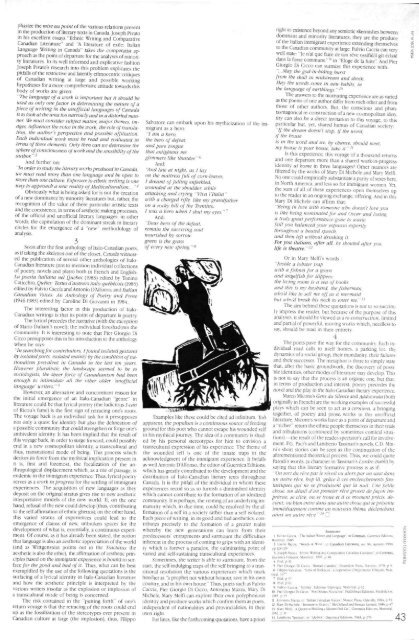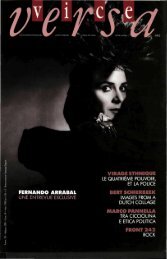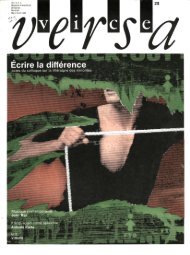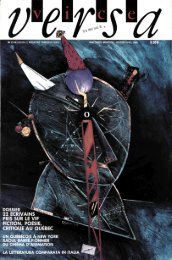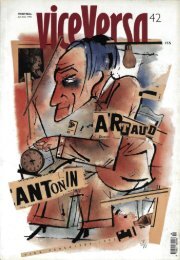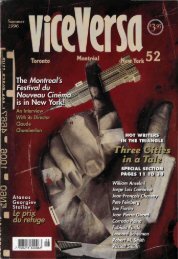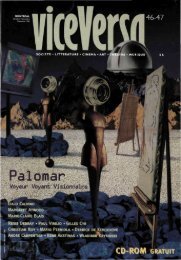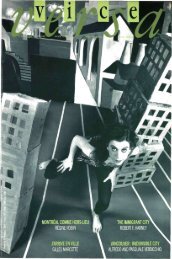N. 16 Italia : Imaginations Passions Parcours - ViceVersaMag
N. 16 Italia : Imaginations Passions Parcours - ViceVersaMag
N. 16 Italia : Imaginations Passions Parcours - ViceVersaMag
Create successful ePaper yourself
Turn your PDF publications into a flip-book with our unique Google optimized e-Paper software.
phasize ihe mise au point of the various relations present<br />
in the production of literary texts in Canada. Joseph Pivato<br />
in his excellent essays "Ethnic Writing and Comparative<br />
Canadian Literature" and "A literature of exile: <strong>Italia</strong>n<br />
Language Writing in Canada" takes the comparatist approach<br />
as the point of departure for the analyses of minority<br />
literatures. In its well informed and explicative fashion<br />
Joseph Pivato's research into this problem explicates the<br />
pitfalls of the restrictive and latently ethnocentric critiques<br />
Of Canadian writing at large and possible working<br />
hypotheses for a more comprehensive attitude towards this<br />
body of works are given:<br />
"The language of a work is important but it should be<br />
used as only one factor in determining the nature of a<br />
piece of writing in the unofficial languages of Canada<br />
is to look at the area too narrowly and in a distorted manner.<br />
We must consider subject matter, major themes, images,<br />
influences the voice in the work, the role of transit!<br />
Hon, the author's perspective and possible affiliation.<br />
Each individual work must be read and evaluated in<br />
terms of these elements. Only then can we determine the<br />
sphere of consciousness of work and the sensibility of the<br />
author." $<br />
And further on:<br />
"In order to study the literary works produced in Canada.<br />
we must read more than one language and be open to<br />
more than one culture. Exposure to ethnic writing is one<br />
way to approach a new reality of Multiculturalism..." 4<br />
Obviously what is being asked for is not the creation<br />
of a new dominance by minority literatures but, rather, the<br />
recognition of the value of these particular artistic texts<br />
and the coexistence, in terms of aesthetic making processes,<br />
of the official and unofficial literary languages: in other<br />
words, the capitulation of the dominant streak in literary<br />
circles for the emergence of a "new" methodology of<br />
analysis.<br />
3<br />
Soon after the first anthology of Italo-Canadian poets,<br />
as if taking the skeleton out of the closet, Canada witnessed<br />
the publication of several other anthologies of Italo-<br />
Canadian literature (not to mention individual collections<br />
of poetry, novels and plays) both in French and English:<br />
La poesia italiana nel Quebec (1983) edited by Tonino<br />
Caticchio, Quêtes: Textes d'auteurs italo-québécois (1983)<br />
edited by Fulvio Caccia and Antonio DAlfonso, and <strong>Italia</strong>n<br />
Canadian Voices: An Anthology of Poetry and Prose<br />
(1946-1983) edited by Caroline Di Giovanni in 1984.<br />
The interesting factor in this production of ltalo-<br />
Canadian writings is that its point of departure is poetry.<br />
The lyrical precedes the narrative (with the exception<br />
of Mario Duliani's novel); the individual foreshadows the<br />
community. It is interesting to note that Pier Giorgio Di<br />
Cicco presupposes this in his introduction to the anthology<br />
when he says:<br />
"In searching for contributors, I found isolated gestures<br />
by isolated ports, isolated mainly by the condition of nationalism<br />
prevalent in Canada in the last ten years.<br />
However pluralistic the landscape seemed to be to<br />
sociologists, the sheer force of Canadianism had been<br />
enough to intimidate all the other older 'unofficial<br />
language' writers." 1 '<br />
However, an alternative and concomitant reason for<br />
the initial emergence of an Italo-Canadian "genre" in<br />
literature could be that lyrical poetry (the ludicrous lean<br />
of Ricou's fame) is the first sign of retracing one's roots.<br />
The voyage back is an individual task for it presupposes<br />
not only a quest for identity but also the delineation of<br />
a possible community that could strengthen or forge one's<br />
ambivalent identity. It has been implied that the result of<br />
this voyage back, in order to surge forward, could possibly<br />
end in a new cosmopolitan identity, a transcultural and<br />
thus, transnational mode of being. This process which<br />
derives its force from the mythical implication present in<br />
it is, first and foremost, the focalization of the anthropological<br />
displacement which, as a rite of passage, is<br />
endemic in the immigrant experience. Thus, lyrical poetry<br />
serves as a work in progress for the settling of immigrant<br />
experiences. The acquisition of new languages as they<br />
deposit on the original stratus gives rise to new aesthetic<br />
interpretative models of the new world. If, on the one<br />
hand, refusal of the new could develop (thus, contributing<br />
to the self-affirmation of ethnic ghettos); on the other hand,<br />
this varied stratus of experiences could lead to the<br />
emergence of claims of new, unbroken spaces for the<br />
development of what is, essentially, a continuous experiment.<br />
Of course, as it has already been stated, the notion<br />
that language is also an aesthetic appreciation of the world<br />
(and as Wittgenstein points out in the Tractatus the<br />
aesthetic is also the ethic), the affirmation of aesthetic principles<br />
based on the immigrant experience is bound to surface/or<br />
the good and bad of it. Thus, what can be best<br />
exemplified by the use of the following quotations is the<br />
surfacing of a lyrical identity in Italo-Canadian literature<br />
and how the aesthetic principle is interpreted by the<br />
various writers insofar as the explosion or implosion of<br />
a transcultural mode of being is concerned.<br />
The risk contained in the "putting forth" of one's<br />
return voyage is that the retracing of the roots could end<br />
up as the fossilization of the stereotypes ever present in<br />
Canadian culture at large (the implosion), thus, Filippo<br />
Salvatore can embark upon his mythicization of the immigrant<br />
as a hero:<br />
"I am a hero,<br />
the hero of defeat,<br />
and pure tongue<br />
that enlightens me<br />
glimmers like thunder." 6<br />
And:<br />
"And late at night, as I lay<br />
on the mattress full of corn-leaves,<br />
I dreamt of falling enfeebled,<br />
wounded at the shoulder, while<br />
attacking and crying "Viva I <strong>Italia</strong>"<br />
with a charged rifle, like my grandfather<br />
on a rocky hill of the Trentino.<br />
I was a hero when I shut my eyes." '<br />
And:<br />
"Dear hero of the defeat.<br />
remain the surviving soul<br />
nourished by sorrow<br />
green is the grass<br />
of every new spring." 8<br />
Examples like these could be cited ad infinitum. Too<br />
apparent, the populism is a continuous source of feeding<br />
ground for this poet who cannot escape his wounded self<br />
in his mythical journey. The idea of a community is shaded<br />
by his personal stereotypes for him to envision a<br />
transcultural expression of his experience. The theme of<br />
the wounded self is one of the innate traps in the<br />
acknowledgment of the immigrant experience. It befalls<br />
as well Antonio DAlfonso. the editor of Guernica Editions,<br />
which has greatly contributed to the development and the<br />
distribution of Italo-Canadian literary texts throughout<br />
Canada. It is the pitfall of the individual in whom these<br />
experiences recoil so as to furnish a diminished identity<br />
which cannot contribute to the formation of an idealized<br />
community. It is perhaps, the venting of an underlying immaturity<br />
which, in due time, could be resolved by the affirmation<br />
of a self in a society rather than a self isolated.<br />
Each piece of writing, in its good and bad aesthetics, contributes<br />
precisely to the formation of a greater realm<br />
whereby the new generations can learn from their<br />
predecessors' entrapments and surmount the difficulties<br />
inherent in the process of coming to grips with an identity<br />
which is forever a paradox, the culminating point of<br />
varied and self-sustaining transcultural experiences.<br />
Sometimes, the writer is able to surmount, from the<br />
start, the self-indulging traps of the self bringing to a transitional<br />
resolution the various experiences which mark<br />
him/her as "a prophet not without honour, save in his own<br />
country, and in his own house." Thus, poets such as Fulvio<br />
Caccia, Pier Giorgio Di Cicco, Antonino Mazza, Mary Di<br />
Michèle, Mary Melfi can explore their own polyphonous<br />
identity and produce works which confirm them as poets,<br />
independent of nationalities and provincialities, in their<br />
own right.<br />
For lines, like the forthcoming quotations, have a priori<br />
right to existence beyond any semiotic skermishes between<br />
dominant and minority literatures; they are the produce<br />
of the <strong>Italia</strong>n immigrant experience extending themselves<br />
to the Canadian community at large. Fulvio Caccia can very<br />
well state: "Je n'ai que faire de ton rêve ossifié/il gît éclaté<br />
dans la fosse commune." 9 in "Eloge de la fuite". And Pier<br />
Giorgio Di Cicco can surmize this experience with:<br />
"...May the god-in-hiding burst<br />
from the skull in midstream and shock.<br />
May the words come in new habits, in<br />
the language of earthlings. " '"<br />
The answers to the motivating experience are as varied<br />
as the poems of one author differ from each other and from<br />
those of other authors. But, the conscious and phantasmagorical<br />
re-construction of a new cosmopolitan identity<br />
can also be a direct invitation to this voyage, to this<br />
particular but. yet, shared humus of Canadian societv:<br />
"If the dream doesn't stop, if the word,<br />
if the house<br />
is in the word and we, by chance, should meet,<br />
my house is your house, take it." "<br />
Is this experience, this voyage of a thousand returns<br />
and one departure more than a shared work-in-progress<br />
identity at home in three languages? Other nuances are<br />
filtered by the works of Mary Di Michèle and Mary Melfi.<br />
No one could empirically substantiate a parity of sexes here,<br />
in North America, and less so for immigrant women. Yet,<br />
the sum of all of these experiences open themselves up<br />
to the reader in an ongoing exchange, offering. And in this<br />
Mary Di Michèle can affirm that:<br />
"Being in love with someone who doesn't love you<br />
is like being nominated for and Oscar and losing.<br />
a truly great performance gone to waste.<br />
Still you balanced your espresso expertly<br />
throughout a heated speech.<br />
and then left without drinking it.<br />
For you <strong>Italia</strong>ns, after all, he shouted after you,<br />
life is theatre."' 2<br />
Or in Mary Melfi's words :<br />
"Inside a lobster trap<br />
with a fishnet for a gown<br />
and angelfish for slippers;<br />
the living room is a sea of hooks<br />
and this is my husband, the fisherman,<br />
who'd like to sell me off as a mermaid<br />
but who'd break his neck to enter me." 1 *<br />
The aim behind these quotations is not to so succintly<br />
impress the reader, but because of the purpose of this<br />
analyses, it should be viewed as a re-construction, limited<br />
and partial of powerful, moving works which, needless to<br />
say, should be read in their entirety.<br />
4<br />
The poets pave the way for the community. Each individual<br />
road calls to itself homes, a parking lot: the<br />
dynamics of a social group, their mundanity. their failures<br />
and their successes. The metaphor is there to simply state<br />
that, after the basic groundwork, the discovery of possible<br />
identities, other modes of literature may develop. This<br />
is not to say that the process is an organic one, but that,<br />
in terms of production and interest, poetry precedes the<br />
novel and the play in the Italo-Canadian literary experience.<br />
Marco Micone's Gens du Silence and Addolorata (both<br />
originally in French) are the working examples of successful<br />
plays which can be seen to act as a cerniera, a bringing<br />
together, of poetry and prose, works in this unofficial<br />
literature. Micone's works have as a point of departure and<br />
a "richer" return the ethnic people themselves in their trials<br />
and tribulations (contoured by sometimes comical situations)<br />
—the result of the reader-spectator's call for involvement.<br />
EG. Pad's and Lamberto Tassinari's novels. CD. Minni's<br />
short stories can be seen as the continuation of the<br />
aforementioned theoretical process. Thus, we could quote<br />
Parodi's words, (a character in Tassinari's L'ordre établi) by<br />
saying that this literary formative process is as if:<br />
"On sort du rêve par le réveil ou alors par un saut dans<br />
un autre rêve, hop là, grâce à ces enclenchements fantastiques<br />
qui ne se produisent que la nuit l ne petite<br />
chose, un détail d'un premier rêve grossit de façon imprévue,<br />
se clive, ou se troue et à ce moment précis, devient.<br />
ou bien entre dans une autre chose qui se présente<br />
immédiatement comme un nouveau thème, déclenchant<br />
ainsi un autre rêve.<br />
• i-i<br />
D<br />
Footnotes<br />
1 Fulvii) Caccia, The <strong>Italia</strong>n Writer jnd Language m Contrasts. Guernica Edition*.<br />
Montreal, 1985<br />
2 Laurie RlCOU, Words S Wtee", in Canadian literature no S6, Aulumn 1980<br />
pp 12K-129<br />
J, Joseph Pivaro, "Ethnic Writing and Comparator Canadian Literature . in Contrasts,<br />
Guernica Editions Montreal. 1985, p JO<br />
4 Ibid, p M<br />
•> Picr Giotgio Di Cicco. Roman Candies". Hounslo» Press, Totnntu. 1978, p9<br />
6. Filippo Salvatore, Suns of Darkness'. Cooperative d'Imprimerie Véhicule. Montreal.<br />
1971<br />
- Ibid, p J7<br />
8. Ibid. p6l<br />
9 Fulvio i .mu. Irpinu Edition- Triptyque, Montreal, p 12.<br />
Ill l'ict Giorgio Di Cicco post Sixties No-turne". Fiddtehead Editions, Frcdcricton.<br />
I98S. p JJ<br />
11 Antonino Mua, m <strong>Italia</strong>n i 'anadian Voice.- Mosaic Press. Oakville. I98-», p S5.<br />
12 Mat) Di Michèle. 'Immune toOraviri Mcl Iclland and Stevari Limited. 1986. p-T.<br />
13 Mar) Melfi. A Queen is Holding j Mummified Cat", Guernica Editions. Montréal,<br />
1982, p 'l<br />
Il Umberto Tassinan. in Quêtes . Guernica Editions, 1965, p 276<br />
><br />
z —<br />
8<br />
c<br />
2<br />
ê<br />
43


